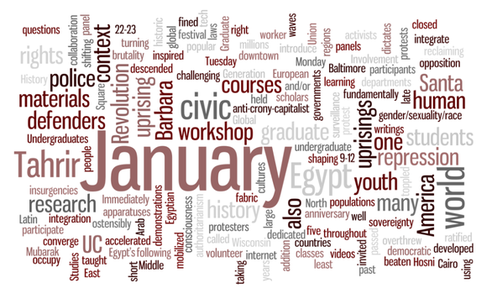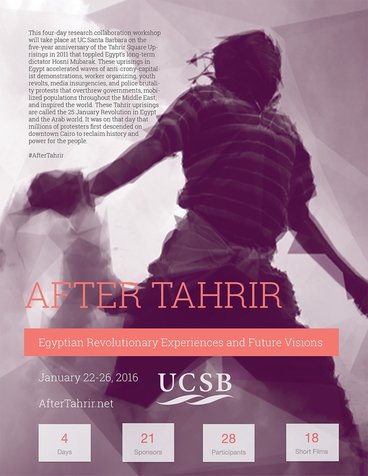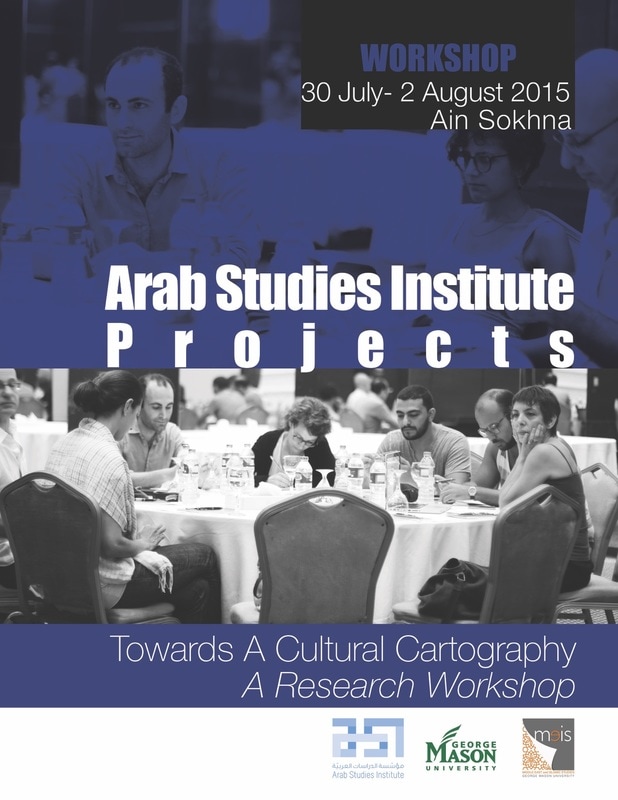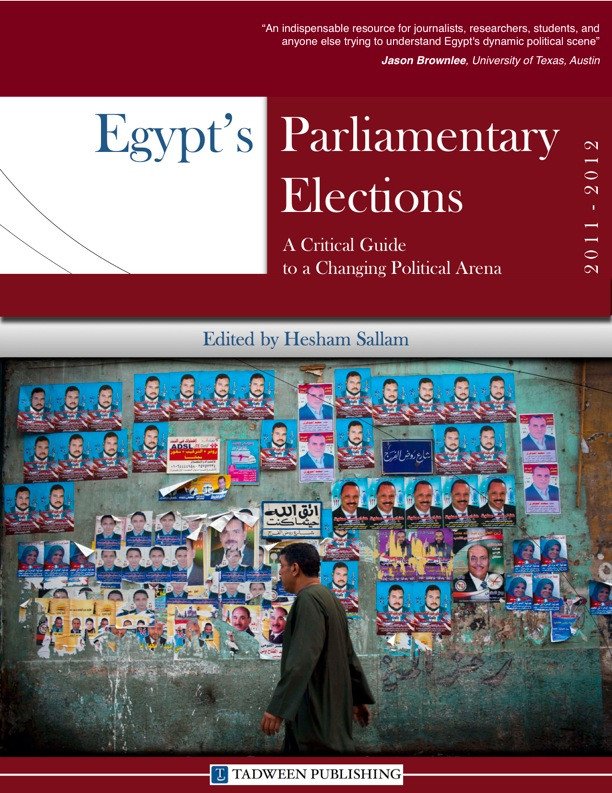- FAMA
- Researchers
-
Projects
- MESPI
- Knowledge Production Project >
-
Political Economy Project
>
- Development and the Uprisings
- Class Formations and Dynamics
- The Palestinian Economy: Fragmentation and Colonization
- Tunisia: A Political Economy in Transition
- Migrant States, Mobile Economies: Rethinking the Political in Contemporary Turkey
- Political Economy of the Middle East: Continuities & Discontinuities in Teaching & Research
- 2016 Political Economy Institute
- The Lebanon Project >
- The Palestine Project >
- The Civil Society Project >
- Middle East Media Project >
- The Egypt Project >
- Refugees and Migrants Project >
- Black-Palestinian Transnational Solidarities Project
- Initiatives
- Events
- Summer Institutes
- Internships
- Blog
T H E E G Y P T P R O J E C T
The Egypt Project results from a collaboration between the Arab Studies Institute and numerous institutions and organizations, including University of California - Santa Barbara, Kazeboon, R-Shief, and Mosireen, to connect scholars, artists, and activists to chart Egypt's social, political, and artistic trajectory before, during, and after the January 25 Revolution.
|
Pedagogy
|
Workshops
|
Audio/Podcast
|
|
The Egypt Page on Jadaliyya features content curated especially for the classroom, including topical roundtable discussions, archived conferences and curricula ideas.
|
A variety of research workshops are conducted under the rubric of The Egypt Project, including 2016's After Tahrir and 2015's Towards a Cultural Cartography. Full event details are featured on the workshops' respective pages, linked above.
|
Status Audio Journal regularly publishes interviews, analyses and reports centering on Egypt. For a complete list of Egypt content on Status, visit the dedicated Audio Content page on FAMA.
|
Highlights
|
22-26 January 2016 - Santa Barbara, California
|
E G Y P T ' S 2 0 1 2 P A R L I A M E N T A R Y E L E C T I O N S
As part of the Egypt Elections Watch (EEW), Jadaliyya and Ahram Online, with the Center of Contemporary Arab Studies (Georgetown University) and the Middle East Studies Program (George Mason University) as co-sponsors, will produce articles/posts/profiles on a weekly basis, covering organizations, political parties, coalitions, relevant laws and procedures, and profiles of key individuals related to the Egyptian elections. This is in addition to news updates summarizing major developments surrounding the lead-up to the election, such as emerging or shifting alliances, new political positions, and candidacy announcements. For a listing of EEW’s team members please click here.
|
click above for more details at TadweenPublishing.com
|
Edited by Hesham Sallam
The toppling of President Hosni Mubarak, along with his ruling National Democratic Party, in the wake of the 2011 eighteen-day uprising has changed the face of Egyptian politics in unprecedented ways. The aftermath of the uprising brought to the forefront of Egypt’s electoral arena new political actors who continue to shape the dynamics of continuity and change in post-Mubarak Egypt. The need for developing a nuanced, historically grounded understanding of who these actors are and their roles in ongoing conflicts over the meaning and future of the January 25 Revolution has never been greater.
As the first multi-party national election after the 2011 uprising, the 2011/2012 parliamentary elections marked an important juncture in Egyptian politics. The lead-up to the elections witnessed the emergence of a new political arena composed of a variety of previously unknown parties, coalitions, and figures. Based on Jadaliyya and Ahram Online’s joint coverage of the parliamentary elections,Egypt’s Parliamentary Elections, 2011-2012 provides readers with a critical look at Egypt’s political field during the lead-up to the vote. The first section comprises a comprehensive guide to the most important political parties that participated in the elections, including each party’s history, plans for parliamentary elections, positions on salient issues, political alliances, and key leaders. The second section includes profiles of prominent individuals who have shaped the political context in which the elections were convened. The third section summarizes the major rules and laws that governed the 2011/2012 elections. The volume includes an appendix detailing the elections results for the lower house of parliament. |
- FAMA
- Researchers
-
Projects
- MESPI
- Knowledge Production Project >
-
Political Economy Project
>
- Development and the Uprisings
- Class Formations and Dynamics
- The Palestinian Economy: Fragmentation and Colonization
- Tunisia: A Political Economy in Transition
- Migrant States, Mobile Economies: Rethinking the Political in Contemporary Turkey
- Political Economy of the Middle East: Continuities & Discontinuities in Teaching & Research
- 2016 Political Economy Institute
- The Lebanon Project >
- The Palestine Project >
- The Civil Society Project >
- Middle East Media Project >
- The Egypt Project >
- Refugees and Migrants Project >
- Black-Palestinian Transnational Solidarities Project
- Initiatives
- Events
- Summer Institutes
- Internships
- Blog





